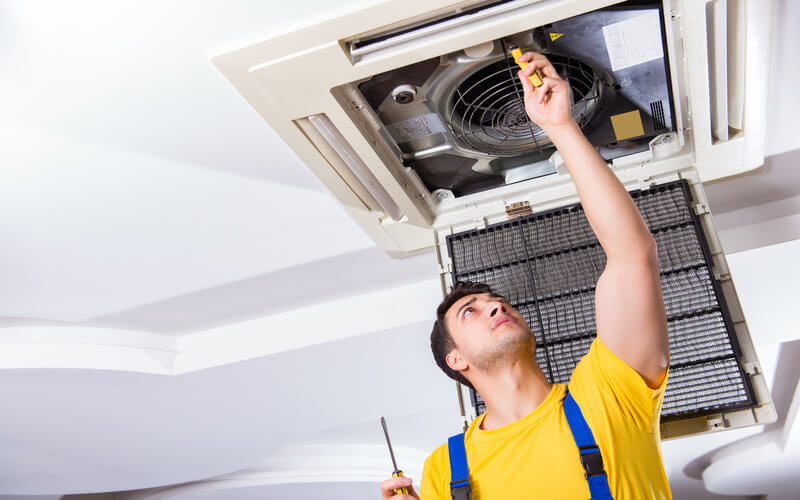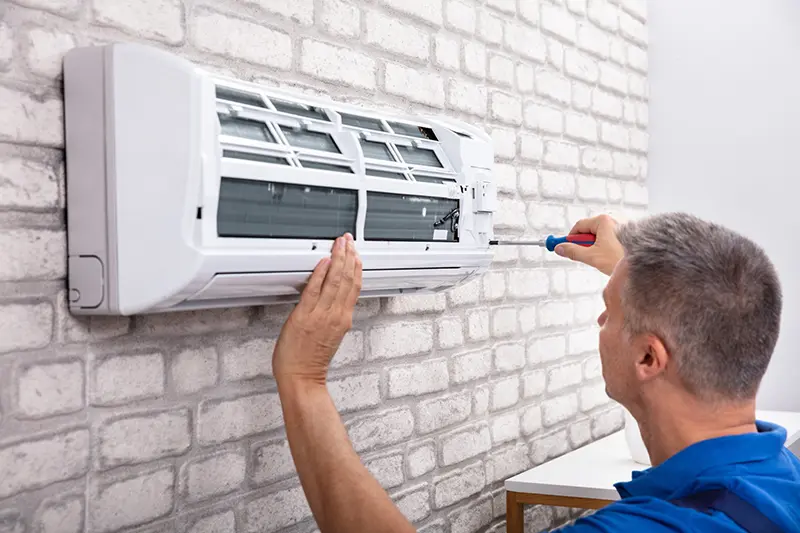The Definitive Guide for Ac Fixing
The Definitive Guide for Ac Fixing
Blog Article
Get This Report on Ac Repair
Air conditioning Repair Near Me: Professional Cooling System Remediation Guarantees Your Home Remains Comfy Throughout The Year
Types of Air Conditioning Systems
When dealing with a/c repair work, understanding the type of air conditioning system you're dealing with can save time, cash, and stress. Ever questioned why some units cool a space faster than others? Or why particular systems seem to break down more frequently? Let's peel back the layers.
Central Air
Our Ac Air Conditioner Repair Diaries
Picture a cool breeze flowing through an entire home, whispering comfort into every corner. Central air conditioning systems do precisely that. They utilize a network of ducts to distribute cooled air, depending on a compressor and condenser outside, combined with an evaporator coil inside. However when this complex monster falters, pinpointing the problem can be like discovering a needle in a haystack.
Split Systems

Split systems are a popular option for lots of homes-- part indoor system, part outdoor compressor. They offer versatility and performance, however their dual nature implies repair can include either element. Have you ever heard a weird sound outside your home only to discover the indoor unit isn't cooling? That's a timeless indication of a split system problem.
7 Simple Techniques For Ac Repair Near Me
Window Units
These compact warriors battle summertime heat by fitting snugly into a window frame. They combine all elements into a single box. Their simpleness typically means fewer repair work headaches, but ignoring filters or allowing particles accumulation can cause diminished performance or breakdowns.
Ductless Mini-Splits
Ac Repair - An Overview
Ductless systems bypass ductwork totally, making them perfect for homes without existing ventilation. They're quiet, efficient, and surprisingly durable. Yet, when repairs are required, technicians need to be adept at handling refrigerant lines and electrical connections-- no little accomplishment.
Quick Referral Table
| Type | Secret Includes | Typical Repair Work Issues |
|---|---|---|
| Central Air | Ductwork, whole-house cooling | Duct leaks, compressor failure |
| Split System | Indoor & & outdoor units | Refrigerant leakages, fan motor concerns |
| Window Unit | All-in-one, simple setup | Unclean filters, electrical faults |
| Ductless Mini-Split | No ducts, zoned cooling | Line leaks, sensing unit breakdowns |
The Definitive Guide to Fix Air Conditioner
Deciphering the Most Frequent AC Dilemmas
Have you ever questioned check here why your ac system suddenly stops cooling throughout a sweltering afternoon? One typical culprit is a filthy or clogged air filter. This sneaky bad guy restricts air flow, forcing your system to work overtime, which not only minimizes effectiveness however can likewise lead to premature breakdowns. Envision trying to breathe through a headscarf soaked in dust-- it's tiring!
Another regular misstep is refrigerant leaks. These invisible leakages do not simply reduce cooling power but can likewise damage the compressor, the heart of your AC system. How frequently do you look for unusual hissing sounds or ice development on the coils? Capturing these indications early can save you from expensive repairs down the line.
Beyond the Basics: Lesser-Known Issues
Ac Repair Near Me Fundamentals Explained
Sometimes, the thermostat itself is the mischief-maker. Miscalibrated or defective thermostats send out blended signals, triggering the a/c to cycle erratically. Ever skilled your AC turning on and off in rapid succession? That's called brief cycling, a sly performance drainer that can wear parts much faster than you 'd anticipate.
Electrical problems, such as used wiring or a malfunctioning capacitor, might hide underneath the surface. Air Conditioner Repair Near Me. These often manifest as AC systems stopping working to begin or suddenly shutting down. A professional eye understands to check these parts with accuracy tools, something a casual look won't expose
Specialist Tips for Diagnosing Common A/c Concerns
Fix Air Conditioner Things To Know Before You Get This
- Examine and change air filters frequently-- every 1 to 3 months depending upon usage and environment.
- Listen for uncommon sounds like rattling or buzzing that could signal loose parts or electrical faults.
- Inspect the outside unit for debris or obstructions that restrain air flow and cause overheating.
- Search for frost buildup on evaporator coils, a hint towards refrigerant issues or airflow constraints.
- Check the thermostat settings and recalibrate if the temperature level readings feel off.
Quick Referral Table: Symptoms & & Probable Triggers

| Symptom | Probable Cause | Expert Suggestion |
|---|---|---|
| Warm air blowing | Low refrigerant or unclean coils | Tidy coils and examine for leakages right away |
| Short cycling | Thermostat problems or large system | Adjust thermostat settings and consult sizing standards |
| Unit won't start | Electrical faults or capacitor failure | Test circuitry and replace capacitors as required |
| Water leakage | Blocked drain line or frozen evaporator | Clear drain lines and inspect for coil icing |
DIY Air Conditioner Upkeep Tips
The smart Trick of Ac Air Conditioner Repair That Nobody is Talking About
Ever seen your air conditioning unit sputtering like an old engine on a hot summertime day? Overlooking subtle indications frequently implies more than just a sweaty afternoon-- it's a start to unexpected air conditioning repair work costs. What if you could catch those whispers before they turn into wails? Regular do it yourself upkeep can be your first line of defense.
Simple Steps to Keep Your Air Conditioner Running Efficiently
Some Known Details About Fix Air Conditioner
- Tidy or Change Filters: A clogged filter is like trying to breathe through a headscarf. Every 1-3 months, check and swap out your filters. It improves air flow and performance, preventing compressor strain.
- Examine the Condenser Coils: Dust and debris act as undetectable blankets smothering your unit's cooling power. Gently brush or vacuum the coils, but avoid harsh chemicals that may deteriorate the metal.
- Check the Drain Line: When was the last time you looked at your drain pan? A stopped up drain can trigger water leaks and foster mold growth. Flushing it with a vinegar solution month-to-month keeps the circulation clear.
- Seal and Insulate: Are your ductworks whispering leakages? Sealing gaps with mastic or foil tape improves performance and minimize unequal cooling.
Pro Tips Beyond the Essentials
- Measure your system's voltage to capture subtle electrical wear before it stimulates huge problems.
- Listen for unusual hums or rattles-- these acoustic breadcrumbs typically signal loose parts or stopping working motors.
- Keep outdoor units shaded however guarantee at least two feet of clearance around them for optimal air flow.
Ask yourself: Are you hearing your a/c's quiet SOS or just awaiting it to scream? Taking some time for DIY a/c maintenance changes reactive repair into proactive care, saving sweat, tension, and yes, cash.
The 45-Second Trick For Ac Repair
Why Knowledge in Air Conditioner Repair Matters
Imagine this: your air conditioner unit sputters and groans throughout a scorching afternoon, leaving you sweltering inside your home. Would you rely on a novice fumbling with delicate components, or would you look for the reassurance of a professional air conditioning technician!.?.!? The complexities of contemporary a/c systems demand precision and experience. A small miscalculation can intensify a minor malfunction into a pricey catastrophe.
Air Conditioning Repair - Truths
Unseen Intricacies Behind the Cool Breeze
Lots of ignore the layers hidden below the streamlined exterior of an air conditioning system - Air Conditioner Repair Near Me. From refrigerant leaks that calmly drain effectiveness to faulty thermostats that misread temperature levels, these problems need more than a fundamental toolkit. Experts have an eager eye for detecting problems that average homeowners neglect
Vital Tips for Picking the Right Specialist
The Single Strategy To Use For Ac Repair
- Certification and Training: Verify credentials; a service technician trained in the newest HVAC technologies is important.
- Experience with Particular Systems: Not all air conditioner systems are created equal; find somebody knowledgeable about your model's peculiarities.
- Diagnostic Method: Competent professionals utilize advanced tools-- like electronic leak detectors and thermal imaging-- to determine hidden faults.
What to Get out of a Pro's Diagnostic Process
| Action | Purpose | Expert Insight |
|---|---|---|
| Visual Evaluation | Identify obvious wear or damage | Search for deterioration or uncommon noises-- an indication often disregarded |
| Pressure Checking | Find refrigerant leakages | Subtle pressure drops can hint at micro leaks invisible to the naked eye |
| Electrical Testing | Ensure circuit stability | Loose connections can simulate severe mechanical failures |
Ac Repair Things To Know Before You Buy
Why DIY Often Falls Short
Tempting as it is to play with your air conditioning system, DIY fixes regularly miss the source. Topping off refrigerant might temporarily cool your space but disregards leakages that worsen over time. Professional specialists don't simply patch symptoms; they hound the underlying mechanical and electrical faults that sap performance.
The Ultimate Guide To Fix Air Conditioner
Concerns to Ask Before Employing
- What diagnostic tools do you use to determine issues?
- Can you discuss the repair process and expected results?
- Are you familiar with the refrigerants compatible with my system?
- Do you follow safety procedures for dealing with electrical elements?